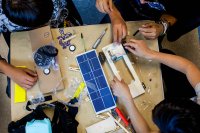Providing Rich Educational Experiences for All Students
With proper scaffolds, students with learning differences benefit greatly from challenging opportunities like project-based learning.
Your content has been saved!
Go to My Saved Content.In the last 50 years, scientists have discovered that our brains are not fixed after early childhood but instead have potential for further change. The brain can adapt, reorganize, and reconstruct itself based on learning and experiences. What we learn can change not only the physical structure of the brain but the way that information is organized.
Exposure to opportunities for active learning as well as the liberty to learn in a social context appears to positively affect brain growth. This should impact how we approach instruction for students with disabilities. Current brain research demonstrates that almost all students are capable of brain growth and change, so they should be exposed to learning experiences that are challenging and engaging. Instead of working around or accommodating areas of weakness, educators can strengthen and support the skills of most students with learning differences through relevant instruction and targeted, research-based interventions.
All students benefit from being provided with rich, authentic learning tasks that make what is being taught come to life. However, project-based learning and similar opportunities are frequently reserved for students in accelerated programs or for gifted students, who tend to be from privileged backgrounds. Students in special education and students who are behind in terms of grade level tend to be placed in remedial and low-track classes that include only direct instruction.
It’s easy to understand why this is often the default approach: With the constant pressure to get students up to grade level in order to pass standardized tests, addressing the skill deficits of students who are testing multiple grades behind can be overwhelming.
However, it’s important to remember that without impactful experiences, school becomes dull and forgettable. Instruction that focuses exclusively on memorization and skill acquisition can be slow and repetitive, leaving students bored and making them feel disconnected from school and their own learning.
Exclusive focus on remediation may also cause students to fall behind their peers in their ability to think critically and make connections. This, in conjunction with the often slow pacing of instruction, makes it hard to imagine that the students will ever catch up to their peers.
Students who are struggling in school need rich, authentic learning experiences just as much as their on-grade-level and advanced peers, but they may require additional supports. There are a few things teachers can do to help these students reach their full potential.
How to Provide Rich Educational Experiences to All Students
Believe that all students are capable of growth: When teachers believe that each student has untapped potential and teach students to believe in their own ability to grow, students are more successful. Teachers who approach learning with a growth mindset perspective can help students understand that it is possible to get smarter and raise achievement by working hard in the classroom. And when teachers encourage hard work and effort, students are more willing to take on challenges.
When a student encounters a challenge in their learning, they benefit from understanding that their brain grows the most during times of struggle. Students who struggle and think they’re failures will tend to shut down and avoid struggling in the future. Students who struggle and think they’re helping their brain grow are more willing to keep trying.
Know students’ current skill levels and build in supports: When planning a learning experience for students on multiple levels, it’s often best to plan the lesson with the most advanced students in mind and then differentiate and provide supports for students who will need them.
For example, high school students may be given the task of creating a business based on their career interests, writing a detailed business plan, and designing a Shark Tank–style marketing presentation to showcase their idea. For this project, all students will need direct instruction on how to create an effective business plan and a detailed rubric outlining the teacher’s expectations of their project and presentation.
Students with learning differences may need access to additional supports such as voice-to-text software to construct and edit their plan, read-aloud software to complete market research, or a math review to more easily complete financial projections and construct a budget. These supports can be offered as options to all students, who can also be given choices such as whether to work alone or in groups, and which group role is best for them.
Keep these four qualities in mind: Instead of focusing exclusively on the memorization of facts and acquisition of content, teachers can present all students with rich, authentic learning experiences. A review of the literature found that four themes are common to all authentic learning experiences:
- Students are engaged in solving real-world problems and have an opportunity to present their findings to an audience beyond the classroom.
- Students have an opportunity to ask questions, develop and apply critical-thinking skills, and analyze their own thinking on a particular subject.
- Students engage in social learning as a community of problem-solvers.
- Students are given choices that direct their learning experiences.
Students with learning differences who participate in project-based work show improvements in attitude, acceptance within the group, and involvement in the learning process. They not only experience learning gains when they participate in project-based learning but also benefit more than other students from hands-on, experiential learning because it better suits their need for a multisensory, adaptable teaching method. Thus, a greater use of project-based learning could be one of the keys to closing the achievement gap between students with learning differences and their peers.
